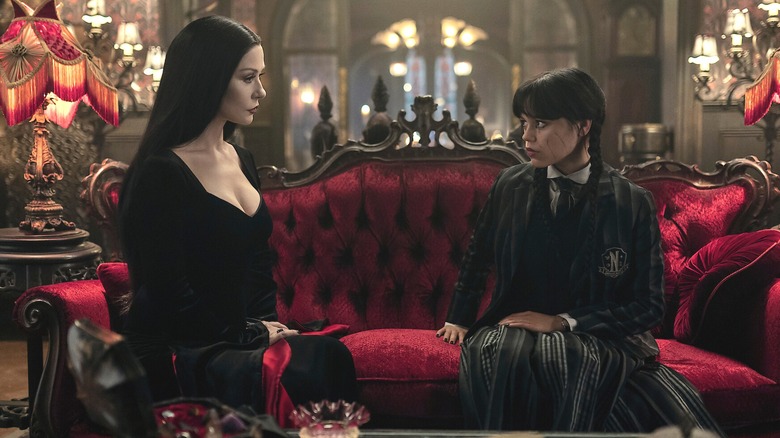This post contains spoilers for Netflix’s “Wednesday.”
The Addams Family might be considered odd from a conventional perspective, but they’ve always been a loving (and functional) family unit. In fact, their love for the bizarre and the macabre never compromises their core values, as both Morticia and Gomez are model parents who care deeply about their children. They’re also rather charitable to those around them, except in cases where someone deserves to be taught a frightening little lesson or two.
In “The Addams Family” film series (and comics), Morticia and Wednesday share a warm relationship, save for the occasional tussle that only brings them closer together. This, however, is not the case in Netflix’s “Wednesday,” where the titular character (Jenna Ortega) repeatedly clashes with Morticia (a dazzling Catherine Zeta-Jones) over the course of two seasons. While Wednesday’s family encourages her to embrace her true nature, Morticia’s constant attempts to protect her daughter often come off as overbearing, fueling Wednesday’s tendencies to put herself in danger.
According to “Wednesday” showrunners Al Gough and Miles Millar, this combative relationship is necessary to our protagonist’s evolving sense of self. The duo spoke to The Hollywood Reporter, with Gough explaining this troubled dynamic in detail:
“There does come that point where she’s [Wednesday] trying to break away from who her mother is, or who she thinks her mother is, and trying to forge her own identity. And I think that’s really where we find Wednesday and Morticia. Obviously, Morticia is very kind of taken aback by this because Morticia is somebody who [thinks] everybody loves Morticia, so she can’t understand what is happening here. It’s really gonna be a journey of Morticia accepting Wednesday for who she is. She’s not a carbon copy of her.”
Wednesday and Morticia’s strained dynamic adds complexity to both characters
In season 1, Wednesday wants to prove that she is nothing like her mother, which is why she chooses social isolation. But her thirst for the truth puts her on a path already walked by Morticia: Wednesday ends up winning the Poe Cup and becomes a member of the Nightshade Society. As these instances prove that the two are more alike than they think, Wednesday confides in her mother in season 2, but Morticia dismisses her anxieties/concerns (partly because she’s scared that Wednesday will end up like her sister, Ophelia). A lack of honest communication exacerbates this brewing distrust, which culminates in a traditionally invoked blindfolded duel under the moonlight.
Millar adds to the assessment by stating that Wednesday’s need to prove herself stems from a desire to establish that Morticia’s overbearing nature is misguided, and that her own risk-taking actions are valid. Even when Morticia does things out of love, her immediate instinct is to hide the truth instead of having an open dialogue with her daughter, which inadvertently incentivizes Wednesday’s urge to unravel secrets. There’s also a constant urge to escape her mother’s shadow, which forms the crux of the show:
“I think what’s great about the Addams Family is the sense that they absolutely, 100 percent, love each other. They’re the weirdest, most functional family on the planet, which is something that’s aspirational, but still, everyone’s gonna forge their own identity, and for Wednesday, that’s very important, something that’s very vital to her. So, I think the shadow that Morticia casts is something that Wednesday needs to feel she has to escape.”
With more family secrets unraveling, season 3 of “Wednesday” might offer the mother-daughter duo some closure, where they can (hopefully) meet each other halfway.










